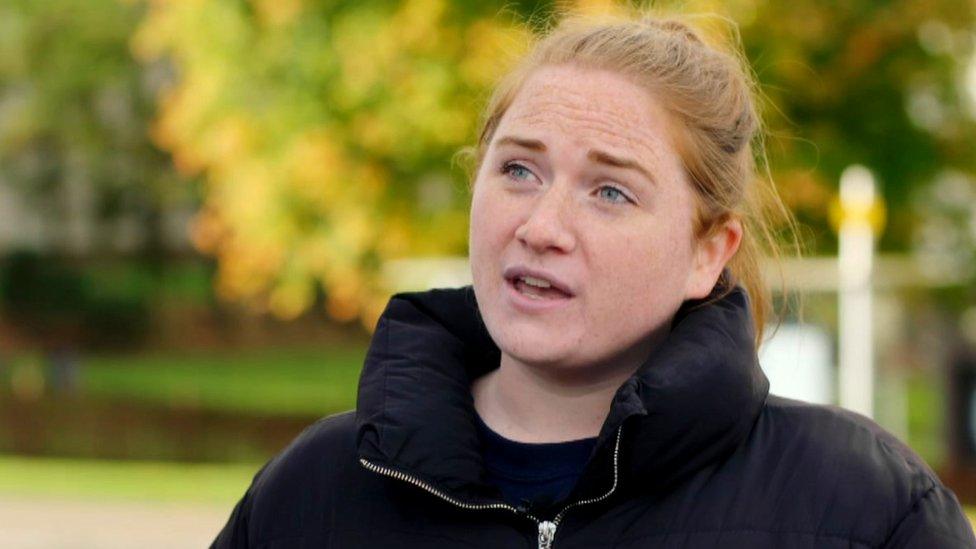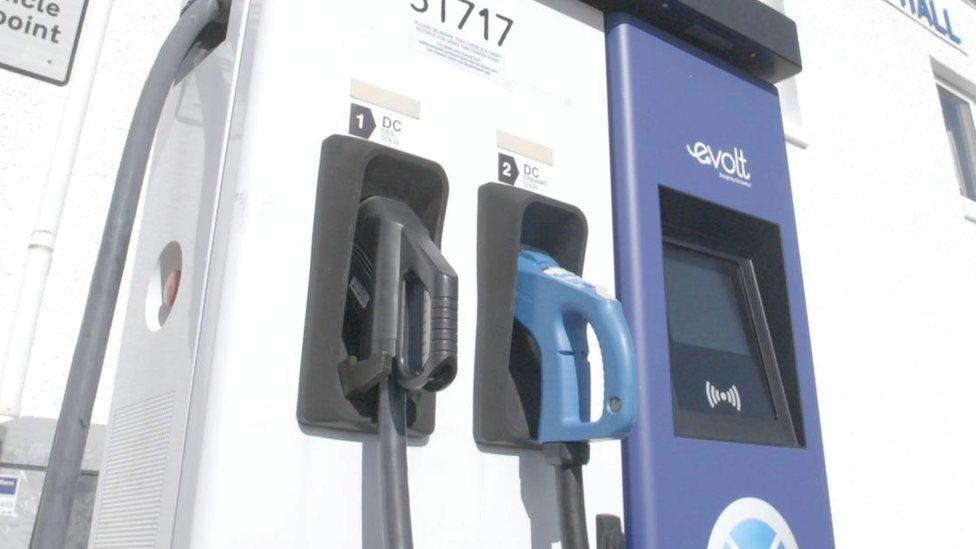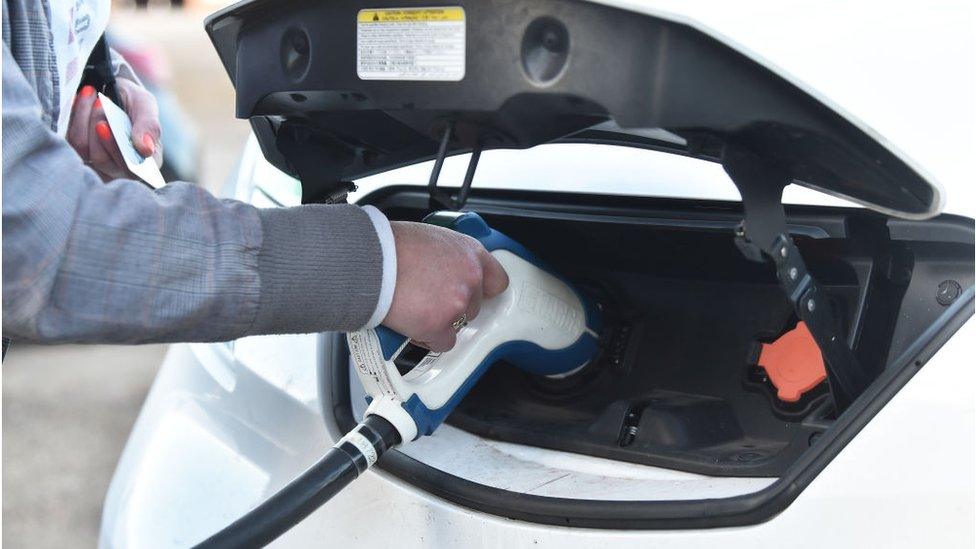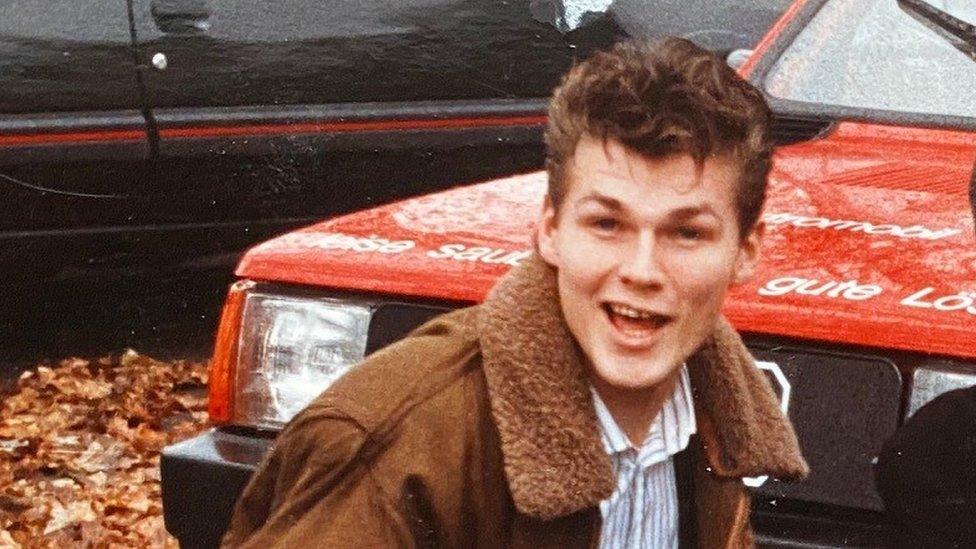One in four Scottish EV charging points faulty
- Published
Laura Young said it had become more difficult to find public charging points that were working and available
Almost a quarter of Scotland's public charging points for electric vehicles (EVs) were faulty when BBC Disclosure did spot-checks on the network.
A snapshot over a six-week period of the state of the 2,200 chargers installed using Scottish government grants uncovered issues at 535 units.
Faults ranged from broken plugs and screens to the system being offline.
Transport Scotland said it would review the data but its own measurements suggested only a 2% fault rate.
There are still only about 50,000 electric vehicles (EVs) on Scotland's roads, just 2% of the total.
But uptake has grown rapidly over the past year.
By 2030 new petrol and diesel cars will be banned and there are forecast to be up to a million EVs in Scotland which will all need somewhere to charge.

Laura Young said it was becoming more of a struggle to charge her car
Laura Young, an environmentalist who has fronted Scottish government campaigns on sustainability, has been driving an EV for three years and said it had become more difficult to find public charging points that were working and available.
"Now it's definitely more of a struggle," she said.
"There's less available because there's more electric cars putting pressure on them."
She told the BBC Disclosure programme Electric Cars - Ready for the Charge? that the crumbling public charging infrastructure had made her consider whether she would "pack this in" and go back to fossil fuel cars.
Laura, who campaigns as Less Waste Laura, lives in a second floor flat in Dundee, with no driveway, so she is entirely reliant on public charging.
"There's a lot that are broken," she said.
"And so it's a bit more of a faff, and a bit more of an inconvenience, and I find it really difficult to charge easily. And it's become a bit more of a disruptor for my life."
"At the beginning, when I was driving along the street, you would see another electric car and think, 'oh hello, how exciting, another electric car.' And now I'm like, 'oh my goodness, they're my competitor'."

The BBC found 535 units were reporting faults on the ChargePlace Scotland App
Laura's experience is echoed by many electric vehicle drivers who feel that the publicly-funded charging network is falling apart.
The BBC did spot checks on each publicly-funded charger during August and September, using the ChargePlace Scotland App to check their status.
It found issues on 23.4% of the entire network, which is owned by the Scottish government.
When we checked whether the problems identified were on the official fault logs, we found fewer than one in 10 appeared.
Transport Scotland figures suggested that 98% of the network was fully operational in September.
Their method was based on the number of minutes each individual machine was "down".
The gap between the official figure and ours was so large, we decided to investigate further.
The majority of chargers are owned by councils and so we asked how many of their chargers had recorded faults in the last year.
Of those that answered, the worst performing was Scottish Borders where every single charger had logged a fault.
And it wasn't alone. Highland, West Lothian and East Dunbartonshire councils had faults on more than 94% of their machines.

The BBC found issues on 23.4% of the entire network
Transport minister Jenny Gilruth said: "I do have confidence (in our data), but I think I want to interrogate some of what you've told me further with ChargePlace Scotland and with my officials in Transport Scotland, to ensure that we are delivering on that expectation, in terms of reliability because I recognise that's key."
About half of Scotland's councils still offer charging for free which many drivers would like to see ended.
Although a nice perk, it tends to leave charge points more congested than in areas where tariffs are applied.
We asked those councils providing free charging how much they had spent on electricity and it added up to about £2.8m.
Free charging is a legacy of a now-abandoned Scottish government policy to encourage more drivers to make the switch.
The transport minister told us it was the right policy at the time and she wouldn't rule out stepping in to force councils into introducing tariffs.
For Laura Young, her commitment to the environment is being strongly tested. The problems she's increasingly encountering have led her to ask some serious questions.
She said: "Three years ago I was a massive advocate for this car. I mean, it is a good car and I love driving it.
"But there are just so many issues that a lot of my friends and family just like 'oh man, seeing the struggle that you've had with it kind of puts us off, we want to wait a bit longer for the infrastructure to get better'.
"I think it makes me really hesitant to recommend it to some types of people who might be in a similar situation to me."
Related topics
- Published2 November 2022
